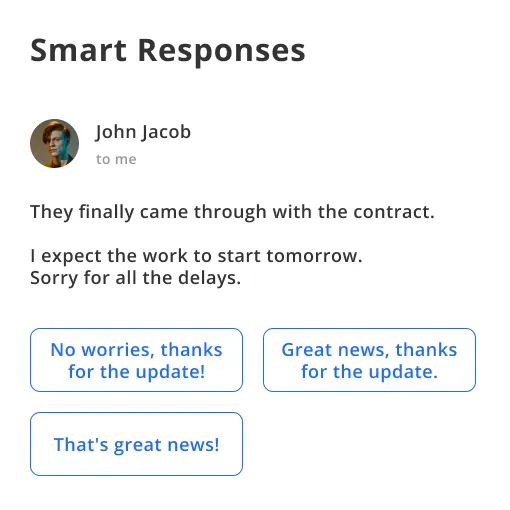What are Smart Responses?
Smart responses, as the name suggests, are intelligent replies offered by AI-powered platforms, chatbots, or virtual assistants. They're designed to understand user intent, respond accurately, and engage effectively in real-time conversations.
How they work
Smart responses operate on Natural Language Processing (NLP) and machine learning algorithms. They analyze user input, break it down semantically, understand the intent, and retrieve the most appropriate response from their knowledge base.
Where they are used
Smart responses find applications in various customer service scenarios, social media platforms, email responses, AI chatbots, and virtual assistants. They aim to provide immediate, appropriate answers, enhancing customer experience.
Role in Customer Service
In today's digital age, smart responses are steadily becoming the backbone of customer service. They handle FAQs, help in issue resolution, and provide round-the-clock assistance.
Importance
Smart responses take the customer service game to the next level. They enable faster responses, reduce wait times, improve customer satisfaction, and lessen the burden on customer service representatives.
Why use Smart Responses?
Now, let's delve into the reasons behind the increasing adoption of smart responses in various industries and operations.
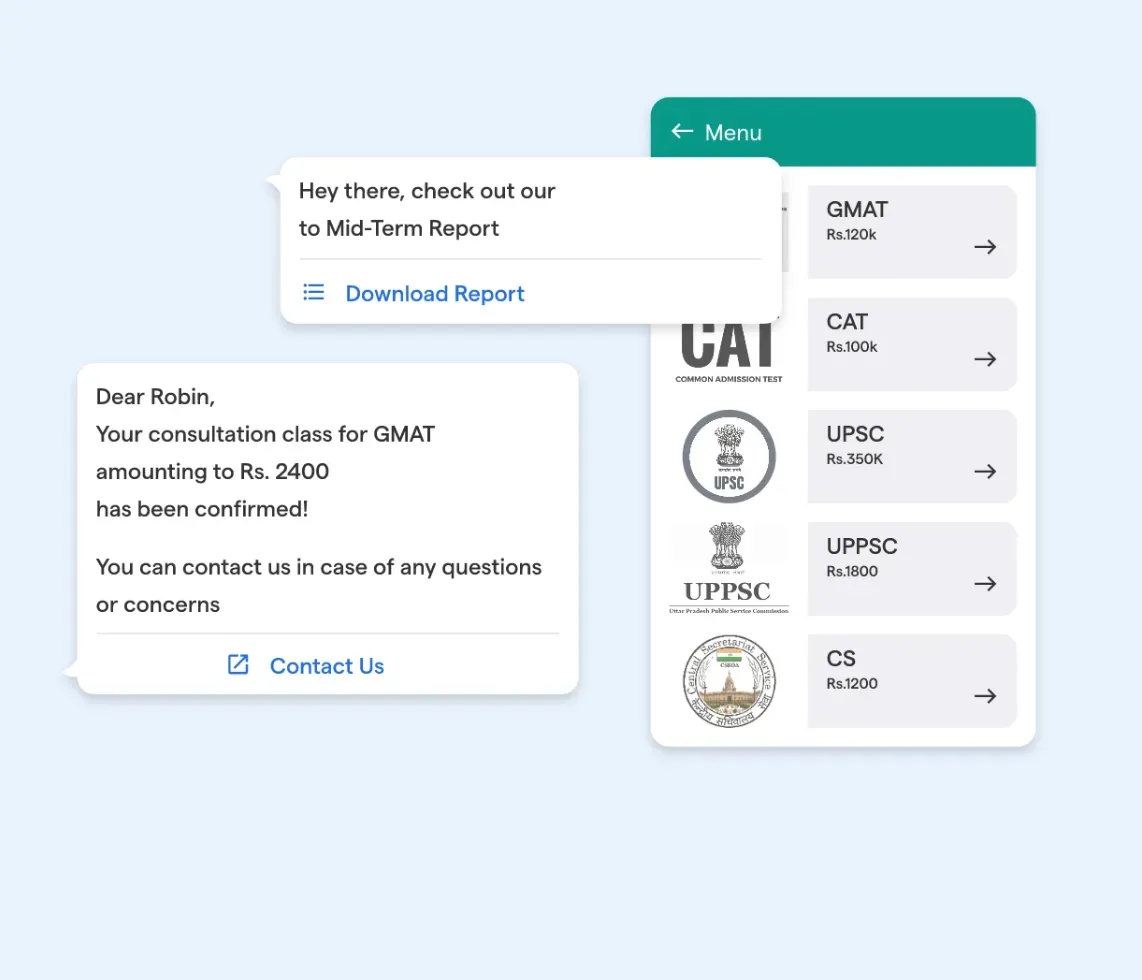
Customer Satisfaction
Smart responses can significantly enhance customer satisfaction by providing immediate, accurate answers to queries, reducing customer effort, and ensuring 24/7 availability.
Efficient Service Operations
Smart responses contribute to efficient business operations by automating repetitive tasks, reducing the time spent by human agents on common queries, and freeing them up for more complex tasks.
Cost Saving
By automating a portion of customer service operations, smart responses reduce the need for large customer service teams, leading to substantial cost savings.
Scalability
Smart responses provide a scalable solution for customer service. Whether you receive 100 or 1000 queries a day, smart responses can handle them all effectively, without any significant cost increase.
Competitive Advantage
In an increasingly digital marketplace, businesses offering instant, accurate responses gain a significant competitive advantage. Customers appreciate quick response times and personalized service that smart responses can offer.
When to use Smart Responses?
Confused about the right scenarios for smart responses deployment? Let's get into it.
High Volume of Repetitive Questions
When customer service receives a high volume of repetitive questions like business hours, return policies, or account balance inquiries, smart responses can provide immediate solutions.
After Business Hours
Smart responses ensure customer service remains uninterrupted, responding to customer inquiries even after business hours.
Routing Inquiries
Smart responses help direct customers to the appropriate department by understanding their needs and then routing the queries efficiently.
Handling Simple Transactions
For routine transactions like booking an appointment, placing an order, or making a payment, smart responses can guide customers through the process.
Scalability Requirements
During peak seasons or business growth phases when customer inquiries might increase significantly, smart responses enable businesses to scale their customer service effortlessly.
Where to use Smart Responses?
Understanding the right context for deploying smart responses takes us halfway through the game. Let's explore.
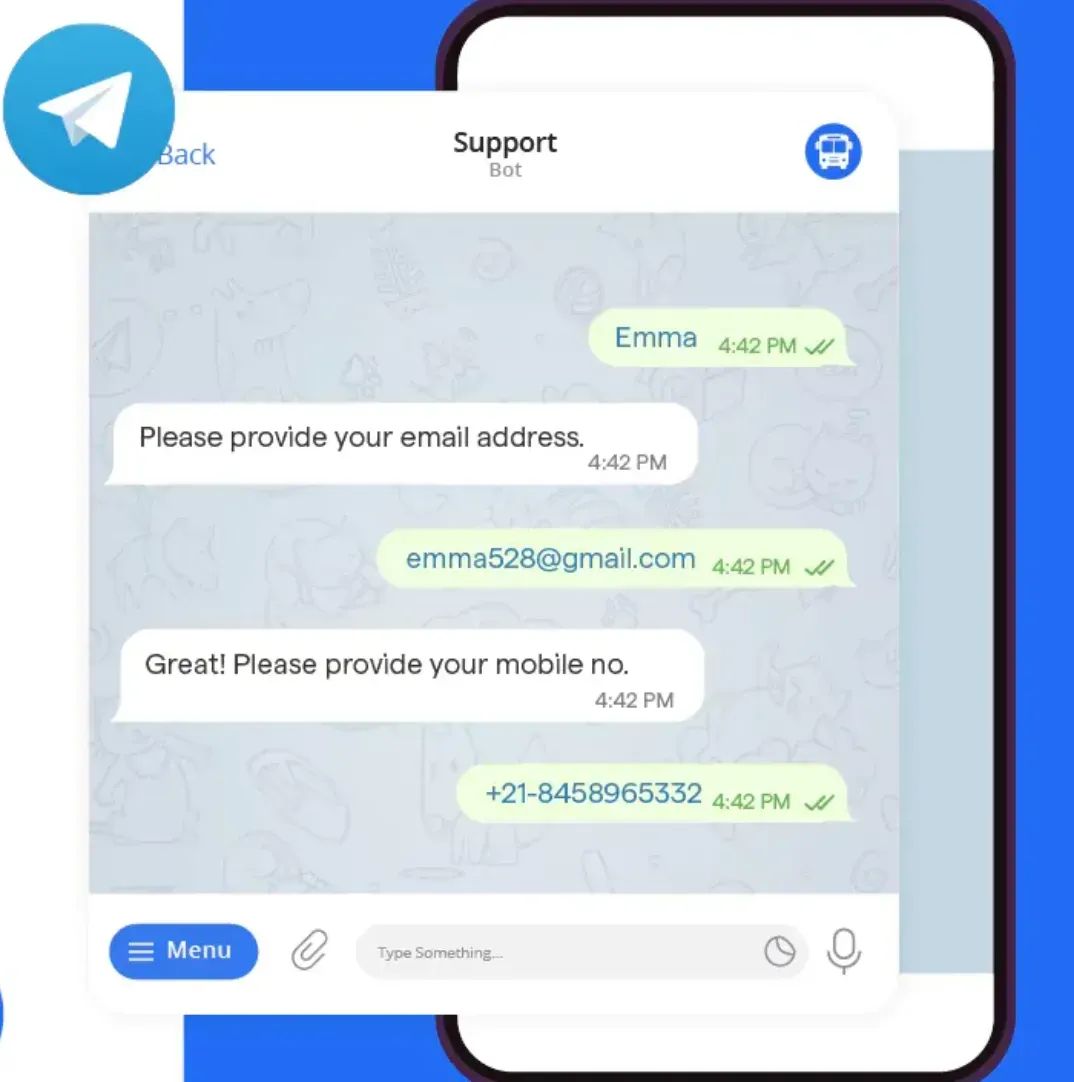
Customer Support
In the customer support domain, smart responses handle FAQs, guide through processes, and provide transaction updates, contributing to a smoother customer service experience.
Marketing Automation
In marketing, smart responses can automate email responses, offer personalized recommendations, conduct customer surveys, or engage customers over social media.
Sales Funnel Optimization
In the sales process, smart responses can offer product details, help customers compare products, or assist them in the purchasing process, thereby optimizing the sales funnel.
Internal Operations
Within an organization, smart responses can automate HR operations, IT support, or internal communication, boosting operational efficiency.
Consumer Platforms
Consumer platforms like eCommerce sites, food delivery apps, or streaming services use smart responses to assist users, recommend options, and handle transaction queries.
How do Smart Responses work?
The functionality of smart responses, powered by cutting-edge AI, is a fascinating study in itself. Let's dive into it.
Natural Language Processing (NLP)
Smart responses rely heavily on NLP, a branch of AI, to understand user language and context. They parse user input, identifying key phrases, entities, and intent.
Machine Learning and Semantic Analysis
The machine learning algorithms train on vast datasets, enhancing their ability to understand and respond to a variety of user queries accurately. The semantic analysis helps understand the sentiment and the broader context.
User Intent Identification
Identifying the user's intent is crucial for generating an accurate response. Depending on the identified intent (information seeking, transactional, or problem reporting), the smart response adjusts its reply.
Response Generation
After understanding the context and intent, the smart response system retrieves the most suitable answer from its extensive knowledge base or generates a new response, if necessary.
Continuous Learning
The smart response systems learn continuously from their interactions, improving their response accuracy over time. Each interaction refines the model, contributing to better customer service.
Best Practices in Using Smart Responses
Now, let's talk about the best way to harness the power of smart responses and avoid common pitfalls.
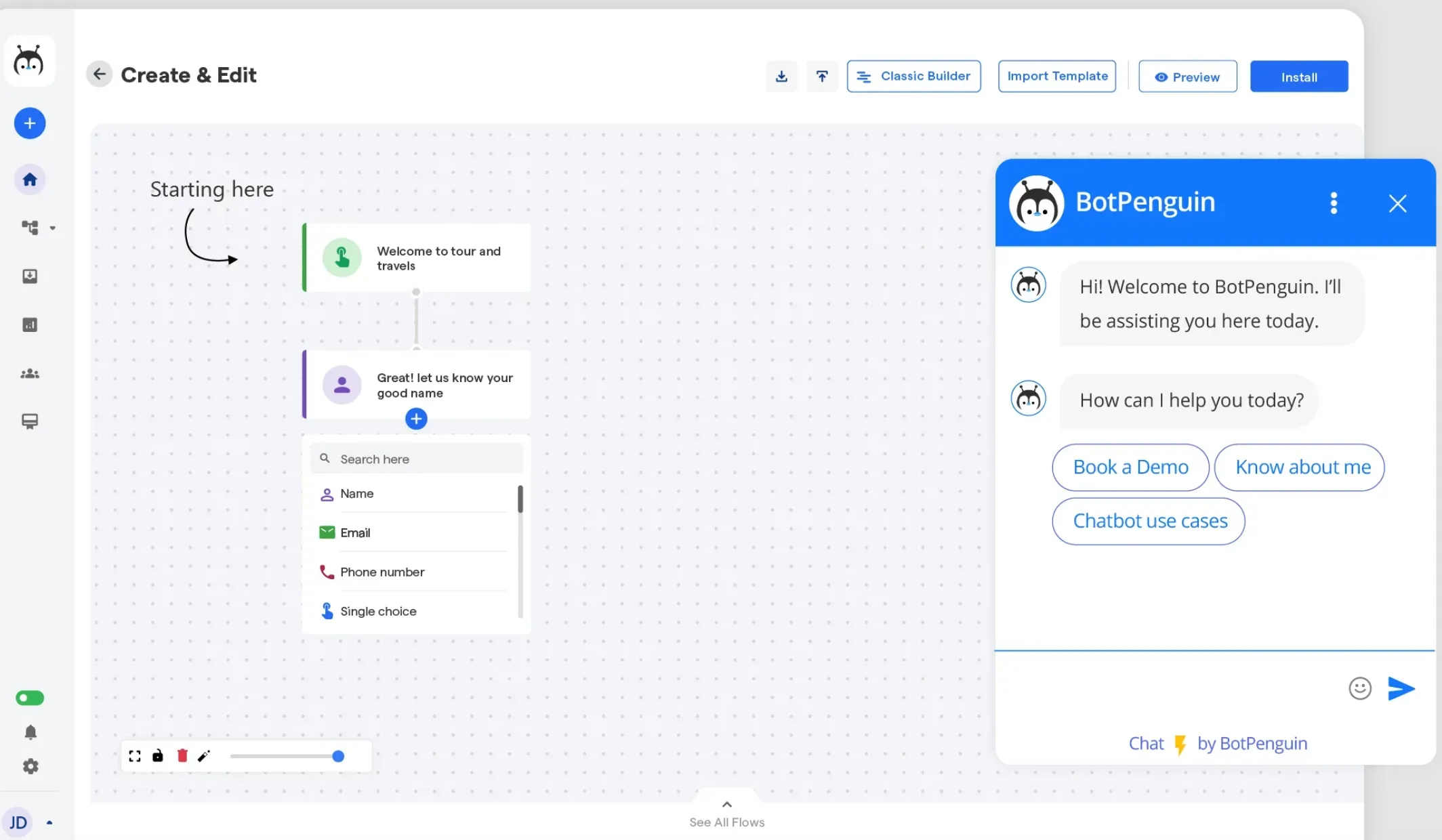
Clear and Concise Responses
Smart responses should always be clear, concise, and directly address the user's query. Overly complicated or vague responses can lead to confusion and degrade the user experience.
Regular Updates in Knowledge Base
To ensure smart responses stay relevant, regular updates to the knowledge base are vital. This includes updating information about products, processes, or company policies.
Feedback Loop
Implement a feedback loop to continuously refine the performance of your smart responses. User feedback provides valuable insights into where the system is succeeding and where improvements are needed.
Seamless Handoff to Human Agents
There should be a smooth transition process in place for situations that require human intervention. If a smart response system can't resolve a query, it should quickly direct the user to a human agent.
Personalization
Personalization can significantly enhance the effectiveness of smart responses. A system that can tailor responses based on user information, past interactions, and preferences can drastically improve user satisfaction.
Challenges in Implementing Smart Responses
Of course, implementing smart responses is not without its hurdles. Here are some challenges you might encounter.
Understanding Complex Queries
While smart responses excel at answering routine or simple queries, they can struggle with complex or ambiguous ones, which may require human intervention.
Lack of Personal Touch
Automated responses, no matter how perfect, lack the empathetic touch of human interaction. This void can sometimes decrease customer satisfaction, particularly in emotionally charged situations.
False Positives and Negatives
Smart responses can misinterpret a user's intent, leading to false positives and negatives. These mistakes can disrupt the customer interaction and possibly irritate users.
Dependence on Quality Data
The performance of smart responses heavily depends on the quality of the training data. Poor quality or minimal data can lead to unhelpful or inaccurate responses.
Costs and Maintenance
Implementing smart response systems requires significant resources, technical expertise, and ongoing maintenance. These costs and efforts can be a deterrent for some businesses.
Emerging Trends in Smart Responses
As with any fast-evolving technology, smart responses too are being shaped by some emerging trends. Let's wrap up as we explore them.
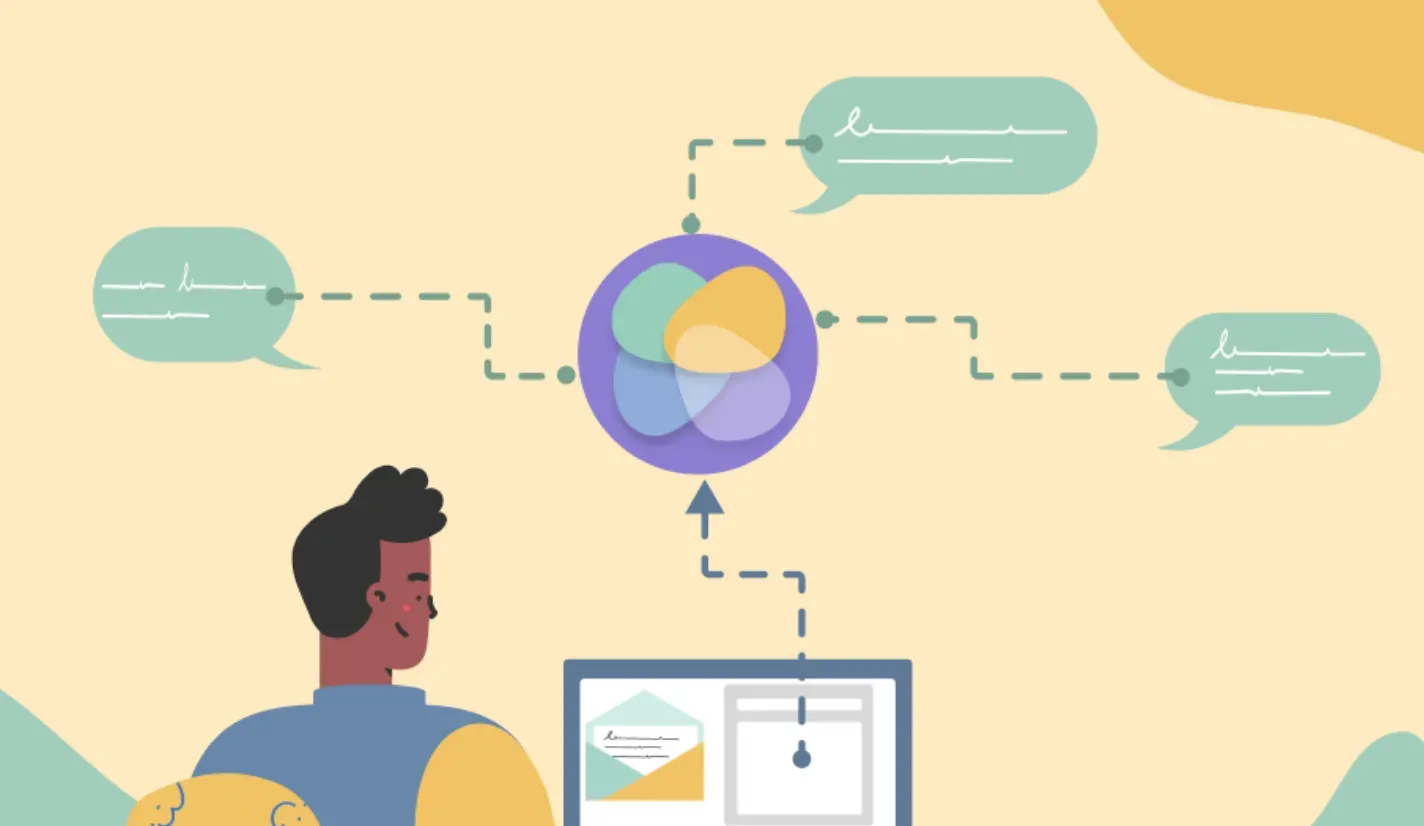
Multilingual Support
With increasingly globalized business environments, systems that support multiple languages are becoming important. Multilingual smart responses allow businesses to serve diverse demographics more effectively.
Voice-Activated Responses
Voice technology is the new wave in customer service. Voice-activated smart responses, like those in smart speakers and virtual assistants, provide users with a hands-free, interactive experience.
Emotional Intelligence
Emerging trends point towards AI systems capable of emotional understanding and empathy. This emotional intelligence will enhance the relatability and effectiveness of smart responses.
Integration with Other Systems
Smart responses are becoming a part of the larger ecosystem of business software solutions. Integration with CRM, sales platforms, or marketing automation tools offers comprehensive, more effective customer service.
Predictive Analytics
By leveraging machine learning and big data, smart responses can go a step further and predict user inquiries, offering solutions before a question is even asked. This predictive feature is set to revolutionize customer service.
Frequently Asked Questions (FAQs)
What Defines a 'Smart Response' in Communication Tools?
A 'Smart Response' analyzes incoming messages and suggests relevant replies. It makes communicating faster and more efficient.
Can Smart Responses Adapt to User Behavior?
Yes, with AI and machine learning, smart responses learn from user choices and patterns for better suggestions over time.
Are Smart Responses Secure and Private?
Most smart response systems are designed with privacy in mind, often processing data on-device without transmitting sensitive information.
How Do Smart Responses Handle Different Languages?
Smart response systems can handle multiple languages by leveraging language-specific AI models trained on diverse linguistic datasets.
What's the Impact of Smart Responses on Customer Service?
Smart responses can significantly enhance customer service by providing instant, accurate, and helpful replies, thus improving satisfaction and efficiency.
